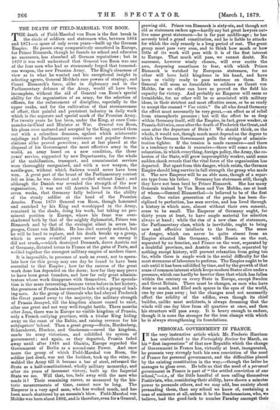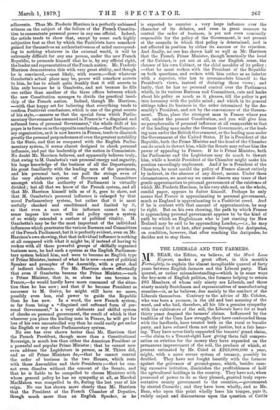PERSONAL GOVERNMENT IN FRANCE.
TN the very instructive article which Mr. Frederic Harrison has contributed to the Fortnightly Review for March, on his "first impressions" of that new Republic which the change of Government in France has, virtually at least, inaugurated, he presents very strongly both his own conviction of the need of France for personal government, and the difficulties plated by the existing constitution in the way,—though the latter he manages to gloss over. He tells us that the need of a personal government in France is part of "the settled conviction of our school,"—i.e., of the little handful of men calling themselves Positivists, who, considering their ability, have shown a minuter power to persuade others, and we may add, less anxiety about persuading theM, than any school we know of, containing a man of eminence at all, unless it be the Sandemanians, who, we believe, had the good-luck to number Faraday amongst their adherents. Thus Mr. Frederic Harrison is a perfectly unbiassed witness on the subject of the failure of the French Constitu- tion to concentrate personal power in any one official. Indeed, the article tends to show that, except by some such highly subjective feat as that by which the Positivists have somehow gained for themselves an authoritativeness of mind correspond- ing to nothing whatever in the external world, it will be extremely difficult for any one person, under the new French Republic, to persuade himself that he is, by any official right, the leader and representative of the French nation. Mr. Frederic Harrison demonstrates this with very great ability, and though he is convinced,—most likely, with reason,—that whatever Gambetta's actual place may be, power will somehow accrete to him, he has to admit quite frankly that it will accrete to him only became he is Gambetta, and not because he fills one rather than another of the three offices between which the new Constitution manages to divide the practical head- ship of the French nation. Indeed, though Mr. Harrison, —with that happy art for believing that everything tends to confirm Positivist conclusions, which is one of the great secrets of his style,—assnres us that the special form which Parlia- mentary Government has assumed in France is" a disguised and softened form of personal Government," the whole drift of his paper is to force on us the opposite conclusion,—that Parliament- ary organisation, as it is now known in France, tends to diminish greatly the personal preponderance of even the greatest notability in the State, and that as compared with the English Parlia- mentary system, it seems almost designed to cheek personal influence, and put the leadership of the nation in Commission. No doubt Mr. Harrison believes, and apparently believes truly, that owing to M. Gambetta's vast personal energy and sagacity, his large knowledge of the business of all the Departments, his great familiarity with the leading men of the provinces, and his personal tact, he can pull the strings even of the very elaborate system of Bureaux and Committees amongst which the authority of Parliament is virtually divided ; but all that we know of the French system, and all that Mr. Harrison himself tells us of it, goes to show, not that M. Gambetta's personal influence is enlarged by that novel Parliamentary system, but rather that it is most usefully checked and conditioned and limited by it, so that even a man of his influence cannot in any sense impose his own will and policy upon a system of so widely extended a surface of political vitality. M. Gambetta's may be far the most important of the individual influences which penetrates the various Bureaux and Committees of the French Parliament, but it is perfectly evident, even on Mr. Harrison's own showing, that that individual influence is nothing at all compared with what it might be, if instead of having to reckon with all those powerful groups of skilfully organised business men, he had such a system as the English Parliamen- tary system behind him, and were to become an English type of Prime Minister, instead of what he is now—a sort of political Speaker and prompter of the Assembly, with a great _deal of indirect influence. For Mr. Harrison shows effectually that even if Gambetta became the Prime Minister,—sueh a Prime Minister, that is, as alone he can become in France,—he would hardly have more command of the situa- tion than he has now ; and that if he became President as successor to M. Grevy, he might still have no more, possibly even less, real power to guide the Republic than he has now. In a word, the new French system, so far from being a "disguised and softened form of per- sonal Government," is a very elaborate and skilful system of checks on personal government, the result of which is that wherever you place the leading man in France, he will get far less of his own uncontrolled way than he could easily get under the English or any other Parliamentary system. No one has ever shown better than Mr. Harrison that the French President, though more than a Constitutional Sovereign, is much less than either the American President or a powerful and popular Prime Minister; that he cannot now even address the Legislature in person, as M. Thiers did, and as all Prime Ministers do,—that he cannot control the order of business in the two Houses, which rests with those Assemblies and their Presidents ;—that he can- not even dissolve without the consent of the Senate, and that he is liable to be compelled to choose Ministers with whose general policy he has no sympathy at all, as Marshal MacMahon was compelled to do, during the last year of his reign. No one has shown more clearly than Mr. Harrison that the President of the French Chamber of Deputies, though much more than an English Speaker, as he is expected to exercise a very large influence over the character of its debates, and even in great measure to control the order of business, is yet not even nominally responsible for the policy of the Government, is not present at the councils in which that policy is determined, and is not affected in position by either its success or its rejection. And finally, no one has shown half so well as Mr. Harrison that the French Prime Minister, though nominally the head of the Cabinet, is yet not at all, in our English sense, the chooser of his own Cabinet, or the chief moulder of its policy ; —that he must reckon with the President of the Republic on both questions, and reckon with him rather as an inferior with a superior, who has to accommodate himself to the President's views, instead of dictating those views ; and lastly, that he has no personal control over the Parliament which, in its various Bureaux and Committees, cuts and hacks about his policy as much as it pleases, till the policy is got into harmony with the public mind ; and which in its general sittings takes its business in the order determined by the As- sembly's President, and not by the convenience of the Govern- meat. Thus, place the strongest man in France where you will, under the present Constitution, and you will give him no paraphernalia of personal influence at all comparable to that of the leading man under the German Government, or the lead- ing man under the British Government, or the leading man under the Government of the United States. If he is President of the Republic, both the Prime Minister and the head of the Chamber can do much to thwart him, while the Senate may refuse him the power of appealing to France. If he is Prime Minister, both the Parliament and the Legislature may do much to thwart him, while a hostile President of the Chamber might make his position exceedingly unpleasant. And if he is President of the Chamber, he must mould the policy of France almost entirely by indirect, in the absence of any direct, means. Under these circumstances, we must say we cannot discern any trace of that gentle approximation to personal government of the existence of which Mr. Frederic Harrison, in his very able and, on the whole, candid paper, appears to flatter himself. Perhaps he only means that France is approximating to personal government, much as England is approximating to a Positivist creed. And if he is content with that amount of approximation, he may be right. But on his own showing, the path by which Frame is approaching personal government appears to be the kind of path by which an Englishman who is just starting for New Zealand may be said to be approaching London,—i.e., he may come round to it at last, after passing through the Antipodes, on condition, however, that after reaching the Antipodes, he decides not to stay there.



































 Previous page
Previous page